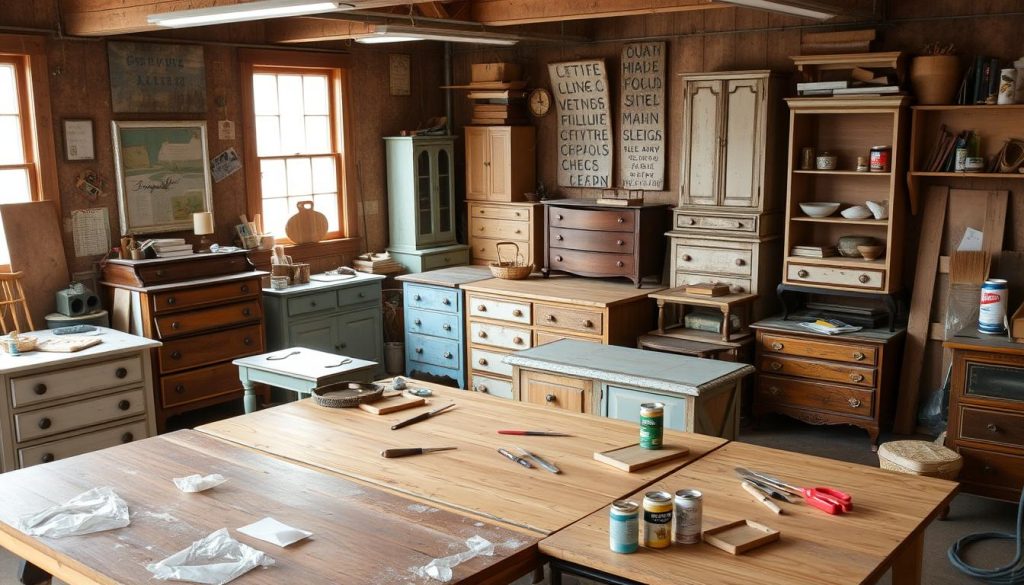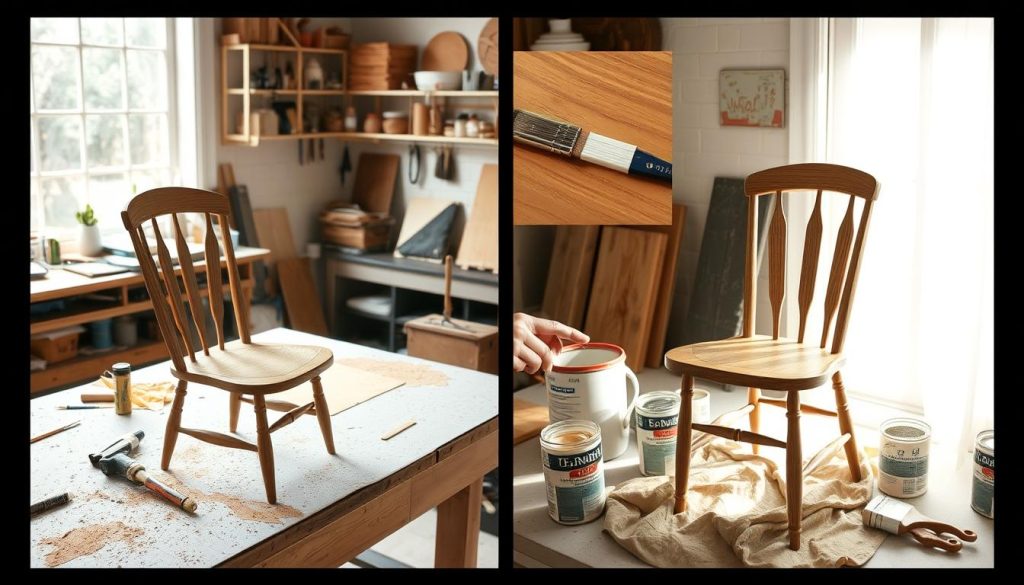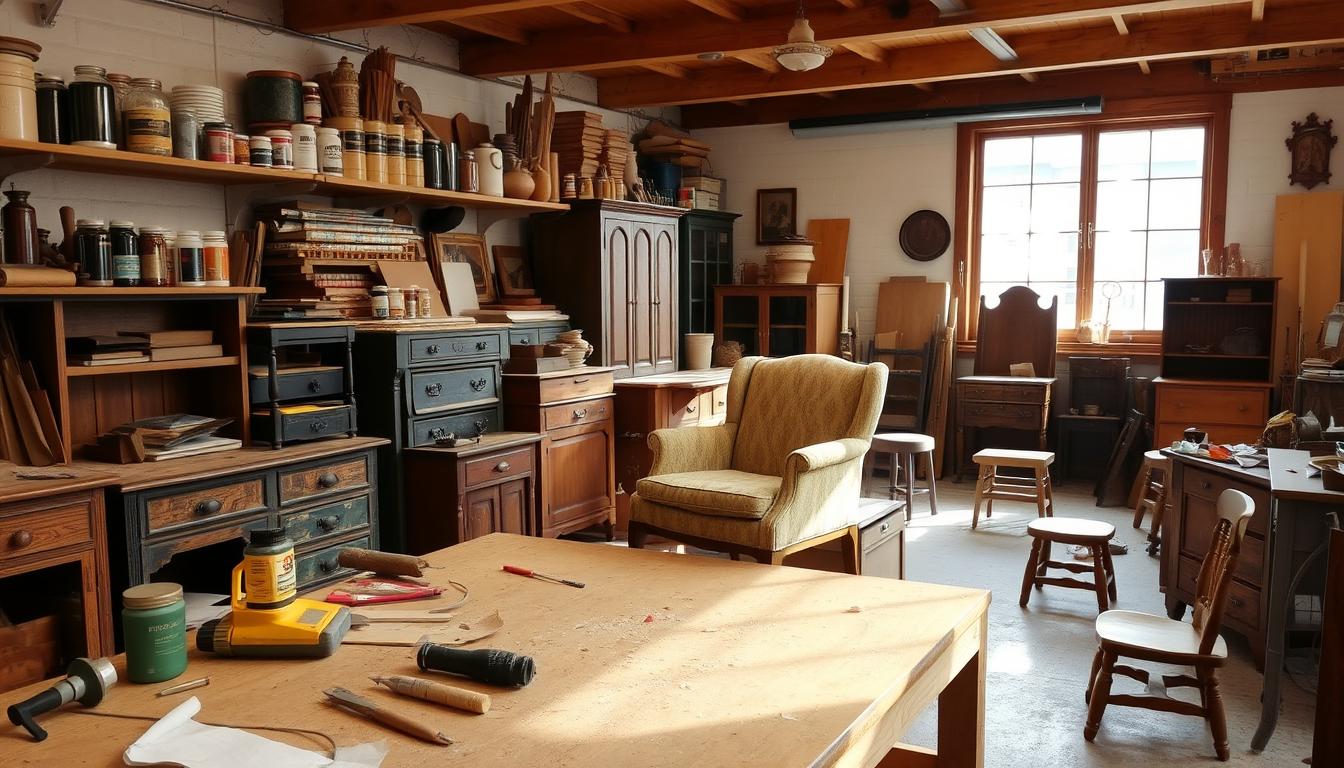Furniture Restoration: A Complete Guide for Homeowners
Ever wondered about the hidden value in old attic furniture? Wood furniture restoration enhances more than just the furniture’s look. It keeps a family’s history alive. Furniture Restoration: A Complete Guide for Homeowners is written by Brian D. Hingley. He is an expert with over twenty years of experience in heirloom furniture revitalization. His book spans 240 pages filled with tips and illustrations. It’s a guide to making your old furniture beautiful again.
This furniture restoration guide includes over 500 color photos. They show you how to fix up worn wood pieces. Say goodbye to common, store-bought furniture. Welcome unique, restored pieces into your home instead. The guide covers how to safely use chemicals, laser cleaning, and more. It will change how you see furniture restoration.
Key Takeaways
- Explore a book packed with photographs and insights, offering over 500 color visuals for intricate guidance.
- With Furniture Restoration: A Complete Guide for Homeowners, benefit from 240 pages of thorough, step-by-step instructions.
- Learn shop-tested methods for furniture restoration, recommended by a seasoned professional, Brian D. Hingley.
- Tackle repairing splits, fractures, and weakened joints using expert, authoritative techniques.
- Sustain the narrative of your furniture by embracing the inviting realm of heirloom furniture revitalization.
- Understand how sustainable practices are reshaping the future of wood furniture restoration.
Why Focus on Furniture Restoration?
In our world today, being green is very important. Furniture restoration benefits are key in home improvement. Fixing old furniture can make it beautiful again. It also helps keep historical furniture alive. This way, we show respect to old craftsmanship in our homes.
Since 1936, Queen Anne Upholstery & Refinishing has led in furniture fixing. They mix old wisdom and new methods. They do Structural Restoration, Surface Refinishing, and Upholstery Restoration. Their work helps keep each piece strong and lovely for more years.
Fixing old furniture is more than making it look nice. It keeps history alive in our homes. By doing this, we also make less trash. So, we help the planet. It’s special when thinking about furniture restoration benefits. We renew furniture in a way that is good for Earth.
Choosing to fix rather than buy new saves money. New, good furniture costs a lot. But fixing an old table or chair is cheaper. This choice adds value to our homes in a smart way.
Queen Anne Upholstery & Refinishing sees many clients restore meaningful pieces. These items may come from family or important events. They have special value. This makes us love and appreciate these items even more.
The process of restoration is truly an art. It needs skilled workers and love. From Patina Preservation to Historical Research and Documentation, the work to keep the original beauty is important and fulfilling.
In conclusion, furniture restoration is great for us and the Earth. It supports a green way of living and honors old craftsmanship. It’s a smart way to make our homes better. It fits well with caring for our planet and valuing our past.
DIY vs Professional Help
Homeowners compare DIY furniture restoration with professional furniture restoration services. They think about costs and quality. DIY lets you control the whole process and might save money. However, pros bring skills and speed for tough or dear items.
- DIY saves cash but takes lots of time, especially for hard tasks.
- Pros make the job quicker, which helps the furniture owner save time.
- At first, paying for pros may seem expensive, but it can be worth it because of how long the work lasts and looks great.
- Teams like Simons Staircase & Furniture Restoration fix things well, making every project top-notch.
| Aspect | DIY Restoration | Professional Restoration |
|---|---|---|
| Cost | Up to 50% savings on minor repairs | Higher initial cost but quality workmanship |
| Time Commitment | Potentially days for complex projects | Efficient completion, time-saving |
| Quality and Safety | Variable, based on individual skill | Consistently high, with expert oversight |
| Suitability for Valuable/Antique Furniture | Not recommended | Advised to maintain authenticity and value |
| Example of Professional Service | – | Furniture Medic, Schoenbauer Furniture Service, Inc. |
When picking between DIY furniture restoration and professional furniture restoration services, it’s about your needs. If you want to keep an item’s history or need the best work, choose a pro. For easier tasks, DIY can be really satisfying and personal.
How to Save Money
Saving money on furniture restoration extends your furniture’s life. It also makes your space feel new without spending much. Seeking affordable furniture restoration techniques? Look no further than yard sales and thrift stores. You can find inexpensive furniture pieces just waiting for a little love.
To save money on furniture restoration, know where to find furniture cheaply. Yard sales and estate sales offer great deals. They can also give your home a unique vintage feel. Though charity shops charge more, the quality of their pieces often makes up for the cost.

Are you new to furniture restoration? Start with easy tasks like sanding or painting. DIY saves more money than hiring experts. Plus, using your supplies allows you to customize the look to match your home perfectly.
| Material | Cost | Usage |
|---|---|---|
| Sandpaper | Affordable | Prepping for paint or stains |
| Paint | Variable | Creating new aesthetics |
| Wood finish | Economical | Sealing and protecting |
Safe restoration practices are crucial too. Always work in areas with fresh air. Wear safety glasses and gloves. Use good tools. This keeps you and your furniture safe. It also makes your projects cleaner and saves money by avoiding errors.
Doing affordable furniture restoration is more than fixing old items. It’s about being kind to our planet. Each piece you restore lowers the need for new furniture. This saves trees and reduces carbon emissions. So, you help the Earth and beautify your home.
Step-by-Step Upgrades
Starting a DIY furniture restoration project can make old items look new and exciting. The process uses old and new furniture refinishing techniques. It begins with checking the item and follows detailed steps. This ensures the furniture’s long life and beauty.
The first key step is evaluating the furniture’s current condition. This is backed by 85% of experts. It helps choose the right materials and methods. This is because 70% of choices depend on the furniture’s material. Begin with a mild soap solution to clean. This mix uses 1 US tbsp (15 ml) of dish soap in 1 gallon (3.78 L) of warm water. It removes dirt without harming the wood.

| Process | Description | Statistics |
|---|---|---|
| Assessment | Check structural integrity and material type | 88% highlight importance |
| Cleaning | Use a non-abrasive soap solution | 100% |
| Stripping | Apply chemical strippers for coatings | 75% recommend for tough finishes |
| Sanding | Begin with coarse and end with fine grit | Adjust grit from 60 to 240 as needed |
| Refinishing | Apply stains and sealants | 90% suggest careful application |
| Protection | Use furniture oils for maintenance | Frequent application as required |
In the sanding phase, start with 40- or 60-grit paper to remove old finishes. Then use 120- or 240-grit to smooth the wood. Wearing safety gear is vital. This stops you from breathing in dust. 95% of experts agree on this.
Refinishing is about looks and protection. Use a gel stain properly to make the piece last longer. Here, 95% of successful efforts focus on the quality of materials used. After sanding and staining, apply a chosen oil like teak or tung. This should be done regularly. It keeps the wood shiny and protects it from damage.
Following these DIY furniture restoration steps and using good furniture refinishing techniques can revive old furniture. They add usefulness and personal style to your home.
Final Tips for Success
In furniture restoration, having a careful eye and loving quality work is key. Making sure repairs are done well is very important. It helps the furniture work right and look good. Cleaning, waxing, and polishing make the furniture’s look even better. Every choice, like picking the right stain, matters a lot.
It’s good to have clear agreements when working for others. This way, everyone is treated fairly. Using tools like QuickBooks helps see if you’re making money. If a project is too hard, it’s okay to say no. This keeps the quality high and maintains your good name.
Love for what you do and how you do it is important in furniture restoration. Work on things that mean something to you. They stay beautiful longer. Showing your work online can bring more fans and customers. New restorers should check out the r/furniturerestoration subreddit for advice.
If you’re new and want to try DIY, there are lots of guides to help you. Want to save money on home projects? Look at homeowner tips for maximizing discounts. There, you can learn about saving and making your home better. Your hard work and smart choices will shape your success in restoring furniture.



